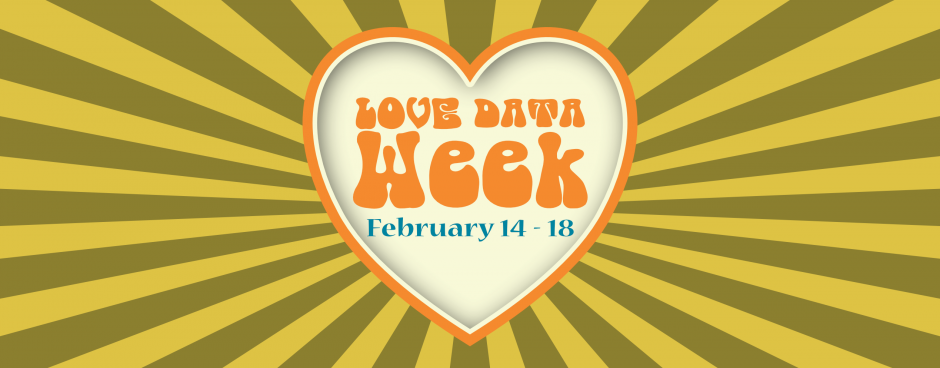
Love Data Week is an international celebration of all things data, scheduled annually in the week of Valentine’s Day. Its aim is to engage community and increase awareness with events that highlight the prominence, value, and appropriate handling of data in our lives and research.
For Love Data Week 2022, libraries at SFU, UBC, UNBC, and UVic collaborated to offer a series of talks and workshops. All events will be hosted online via Zoom and registration is open to everyone. We look forward to seeing you soon!
Monday, Feb 14th, 2022 10:00-11:00am
Keynote: Lessons learned: 20 years of data acquisition and management services

This presentation will discuss the practices utilized by the Murray Research Archive and the Harvard Dataverse to increase the acquisition and dissemination of data, including data at risk. Practices that will be discussed include relationship building between principle investigators (PIs) and repositories, focused acquisition processes, and sustainable services for self-curated open repositories.
Sonia Barbosa, Manager of Data Curation, Harvard Dataverse and Manager of The Murray Archive, Institute for Quantitative Social Science, Harvard University.
Tuesday, February 15th, 2022, 1:30 – 2:30
OSM Can-BICS: Mapping bicycle infrastructure across Canada / Colin Ferster (SFU)
High quality and consistent bicycling infrastructure data are needed to advance research into equity and safety and for planning and promoting active transportation. Yet there is no consistent and complete national dataset for bicycling infrastructure in Canada. We are developing a national bicycling infrastructure dataset. First, we classified OpenStreetMap (OSM) using the Canadian Bikeway Comfort and Safety Classification System (Can-BICS) as a consistent categorization for infrastructure type. Next, we performed a site-specific accuracy assessment by comparing the classification with more than 2,000 reference points from a stratified random sample in 15 cities. We met with city planners to validate the classified network dataset and solicited feedback and improvements in a mapathon. Finally, we used the classified network dataset to develop a standardized measure of cycling infrastructure for all dissemination areas in Canada. In this talk, we will present the OSM Can-BICS classified dataset and metric of the cycling environment, including detail on the development, validation, and descriptive results.
Colin Ferster is a research assistant in the Cities, Health, & Active Transportation Research Lab (CHATR) and at bikemaps.org. Colin uses traditional and emerging sources of geographic data to study people and their environments. He completed a PhD and MSc at the University of British Columbia and a BSc at the University of Victoria — all focused on integrating diverse types of spatial data.
Wednesday, February 16th, 2022, 10:00 – 11:30
An introduction to the Canadian Housing Statistics Program / Josh Gordon and Brahim Boualam (Statistics Canada)
The Canadian Housing Statistics Program (CHSP) was created in 2017 in response to the federal government’s desire to create an integrated and comprehensive source of information on housing. Drawing on a wide array of administrative data, the CHSP has produced an evolving picture of the housing markets in five provinces and three territories, with the remaining provinces scheduled to be completed soon. This presentation documents the nature of the program and some of its central findings, with a focus on the British Columbia housing market. From non-resident ownership to first-time homebuyer statistics, the presentation will explain how researchers can use this data in their own work. In addition, it will outline possible employment opportunities with the program.
Wednesday, February 16th, 2022, 12:30- 2:00
1) Kisâkihitin and Data: Indigenous perceptions of data relations / Kayla Lar-Son (UBC)
Indigenous data sovereignty is the principle that Indigenous peoples have the right to ownership and access of their data no matter where it is stored or who claims ownership of the information. Yet, due to issues with Canadian copyright and power imbalances in cultural heritage institutions, many Indigenous peoples are denied the right to both protect and access their own data. This session explores through the use of Cree principles and laws wahkohtowin, miyo-wîcêhtowin, and keeoukaywin, how we can begin to interact differently with data and learn to kisâkihitin data.
Kayla Lar-Son is the Indigenous Programs & Services Librarian at the Xwi7xwa Library, UBC
2) Just what we needed(!?): Lessons from working together with a user-driven, open-source, geospatial tool to archive and share data across contexts / Environment Community Health Observatory Network (https://www.echonetwork-reseauecho.ca/) (UNBC)
Data governance and sharing become especially challenging when issues traverse sectors and disciplines. This presentation will share lessons and insights from the development and use of a geospatial portal tool that has been developed by First Nations and other groups to address complex environment, community and health concerns. We will introduce the portal as a map-centric, spatially enabled web-based information management system developed and used by various groups around BC and Canada and in this presentation will focus on use by several teams at UNBC in partnership with groups ranging from watershed organisations, school-districts and international partnerships.
Key characteristics of the portal that will be explained: the software is open-source, provides a secure and infinite archive, undergoing constant upgrades and improvements with users, access is specifically set for each submission. Drawing on examples from specific user-groups and partnerships, we will profile lessons and insights from working with this integrative tool including ways that users are harnessing the portals’ ability to host monitoring data, submit content to the Portal and include any digital file format (ex: documents, videos, pictures, hyperlinks, etc.), and search the submissions and information others have shared for viewing.
Presenters
- Aita Bezzola, Research Associate, UNBC and Environment, Community, Health Observatory (ECHO) Network
- Tavia McKinnon, Research Assistant, UNBC: Koh-learning in our Watershed Project
- Margot Parkes, Professor in Health Sciences, Research Lead: Environment, Community, Health Observatory (ECHO) Network; Koh-learning in our Watershed Program
Thursday, February 17th, 2022, 1:00 – 2:00
Qualitative data management with Taguette / Rich McCue (UVic)
Taguette is a user-friendly and free web-based tool that helps researchers to work on their qualitative data. Taguette is a great tool for those who need to analyze interviews, reports, transcripts of any kinds, and a variety of text. If you have some or a lot of text to analyze, Taguette might be a great option for you.
Friday, February 18th, 2022, 10:00 – 11:00
Data Cleaning in OpenRefine / Dean Seeman and Karen Dykes (UVic)
OpenRefine is an open source application for data cleaning and transformation. This presentation will introduce OpenRefine and demonstrate how it can be used to efficiently clean and manipulate large sets of data.
Attendees will be given a presentation on how to:
- Download and install OpenRefine
- Import data and projects
- Analyze data
- Clean inconsistent and duplicate data
- Join, split, and otherwise manipulate data
- Export data and projects
For a list of all events offered by the UBC Library Research Commons including data-related workshops not listed above, see our events calendar.
If you have questions, concerns, or accessibility needs related to Love Data Week events please email research.commons@ubc.ca.